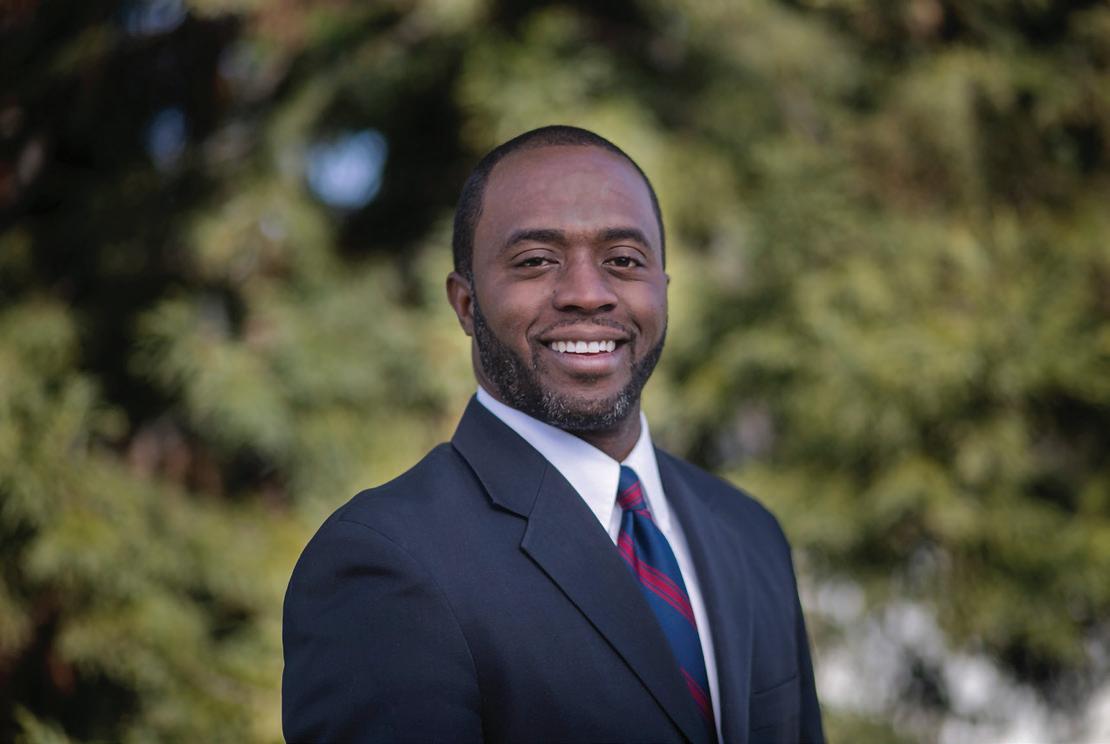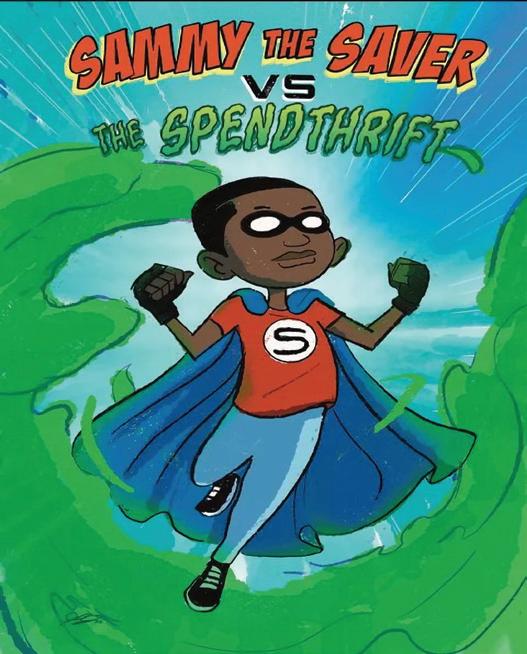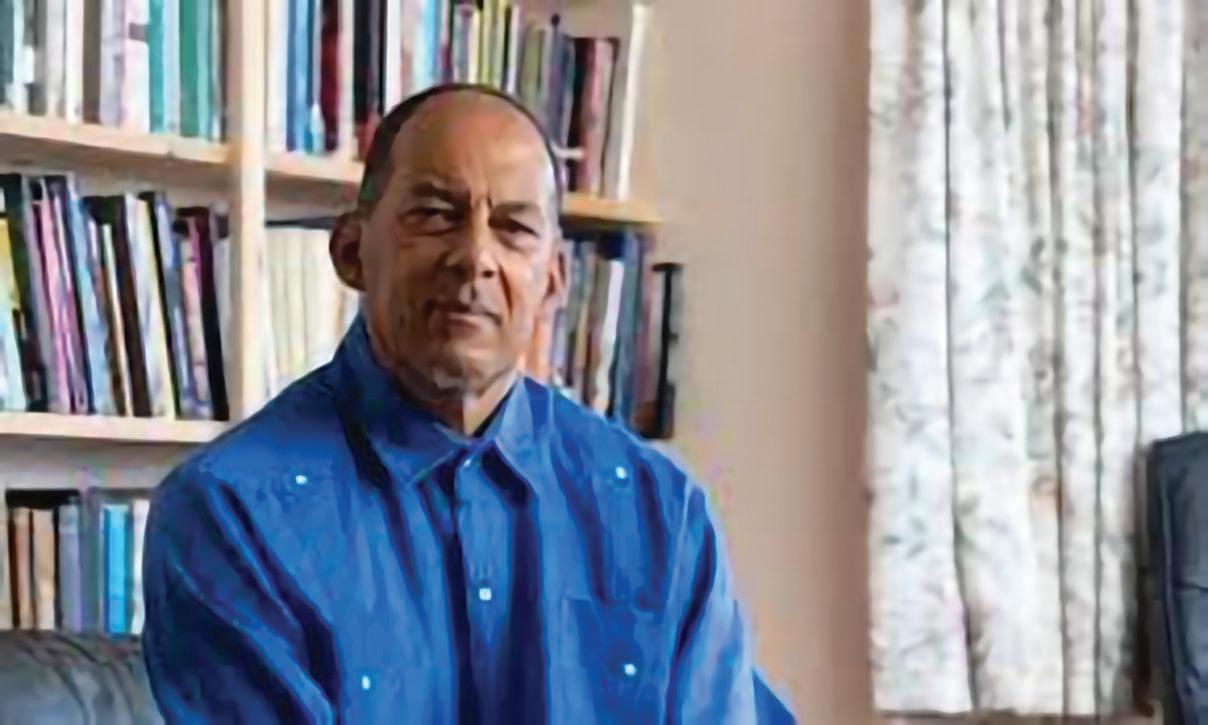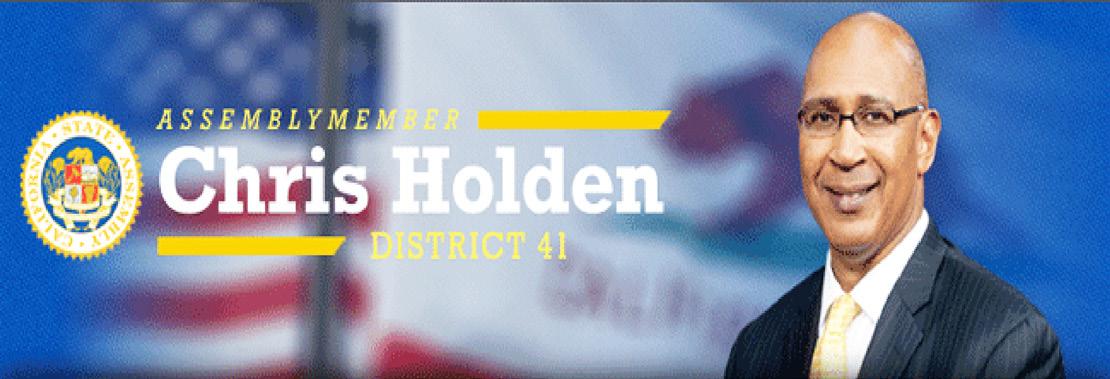Power concedes nothing without a demand. It never did and it never will. Find out just what people will submit to and you have found out the exact amount of injustice and wrong which will be imposed upon them and these will continue till they have resisted either with words or blows or with both. The limits of tyrants are
whom they suppress. —Fredrick
Douglass (1849)
Never forget: how one Black firefighter survived 9/11
By Helen Bezuneh, Special to the AFRO
endurance those
Mothers in Mourning: Moms, Allies Protest Gun Violence in California...continued
Karren Lane, the Deputy Mayor of Los Angeles, stressed the importance of all Californians getting involved in the legislative process to help stem gun violence.
sales for firearms and firearm related items like ammunition and other "precursor parts."
Regina Wilson looked up from her position on the fire engine to find her vision clouded by billowing clouds of white smoke.
She couldn’t help but be stunned by what she was seeing: vehicles were ablaze, buildings were on fire and screaming people–covered in ashes–ran through the streets of Lower Manhattan.
She’d never seen the city like this before– and she’d seen some emergencies. After all, she was a firefighter with the New York City Fire Department, at the dawn of a new millennium.
But this was different. This was September 11, 2001.
“It looked like a war zone,” Wilson told the AFRO. “It was hard, because usually we have to suppress the feeling of fight or flight when we’re feeling scared or don’t know where to start and don’t really know what’s happening. It was just another type of sustainability that you had to keep.”
“You had to dig deep for it in order to stay focused on what you were doing because there was so much uncertainty of what was gonna happen next–what’s gonna
explode?” Wilson said, recalling the anxious questions running through her head. “Is anybody gonna shoot me? Is a building gonna fall? Is a car gonna explode? It was the weirdest feeling.”
Moments before, Wilson was just a second year employee with the fire department. She was at the fire station preparing to start a day on the fire truck when a coworker, John Chipura, asked if they could switch positions for the day.
Knowing he wanted more experience on the truck, Wilson agreed. She would be on the engine, and Chipura would be on the truck.
It was a decision that saved her life.
“It was an indescribable, clear, beautiful, brisk day,” Wilson said. “But it ended up being one of the worst days.”
As she moved her belongings from the truck to the engine, she heard her fellow firefighters loudly cussing in the kitchen. Working in a FDNY firehouse, it was initially passed off as normal. But then she walked into the room. There, she watched as a
Credit: Shutterstock
television newscaster explained: a commercial aircraft had just flown into one of the two towers that made up the World Trade Center.
Those on the truck were immediately dispatched to the burning buildings in Lower Manhattan’s Finance District. The engine followed behind roughly 40 minutes later.
The engine sped through the Brooklyn–Battery Tunnel and was approaching its end when Wilson says she and her colleagues felt their rig shake in a matter it had never done before.
The first building, the South Tower, had fallen. Still, they pressed toward the towers.

Through the blinding smoke, a woman approached. She was covered in dust and having an asthma attack. The first responders washed her face down and instructed her to walk away from Ground Zero. Then came a deafening noise: the North Tower was falling.
“My boss told us all to just run. So we ran back to the engine that we were just trying to get to the command post. I jumped on the back and he told us to put
our masks on,” said Wilson. “I remember trying to hurry up and put my mask on because all I could see was this big cloud of black smoke…I had just put my mask on when we just got consumed by this thick, black smoke.”
Wilson told the AFRO she feared she was living her last few moments on Earth.
“I was like ‘something’s gonna fall on us, we’re gonna die today.’”
As the smoke cleared a bit, the firefighters sprang into action, grabbing equipment to help in any way they could.
The twin towers of the World Trade Center burn behind the Empire State Building in New York, Sept. 11, 2001. In a horrific sequence of destruction, terrorists crashed two planes into the World Trade Center causing the twin 110-story towers to collapse. (AP Photo/Marty Lederhandler)
“We had to draft water from the river in order to put fires out,” she said. “We spent most of the time trying to collect it and hook up with the marine units so that we could draft water to put out some of these building fires and car fires all over the place. You just didn’t even know where to start.”
The chaos unfolded on live television with viewers around the world watching. From Wilson’s point of view, the reality was grim: every single person on her company’s truck died at Ground Zero, including Chipura, the man who switched positions with Wilson.
Chipura was one of 343 firefighters who died that day.
As she lives in the shadow of that disastrous day, Wilson finds
Mothers in Mourning: Moms, Allies Protest Gun Violence in California
Aldon Thomas Stiles | Califoria Black Media
“We are proud to be here at Jordan, and from the housing complexes to the highways we are making our voices known: Let our babies live,” Gipson posted on X, formerly known as Twitter.
At a post-march rally, speakers shared personal accounts, some tearful, about their experiences with gun violence.
“Our commitment is to prevent that violence,” she said. “We cannot do that as a city without the organized political power of everyday people.”
She went on to speak about how the march might have an impact on those who have a vested interest in the prevention of gun violence.
“This event is so significant because one mother suffering alone feels isolated and silenced,” she said. “But when we come together and organize our voices, we are political power. We are organized power.”
Speakers also focused on explaining anti-gun violence bills that Gov. Newsom has signed and others the Legislature has approved.
Assembly Bill (AB) 28, for example, which has been approved by the Legislature, would impose an 11% tax for
Gov. Newsom signed AB 1621, authored by Gipson, last year. It bans ghost guns, which are “unserialized and untraceable firearm” parts that can be assembled without any form of regulation or oversight.
LA Unified School District board member Tanya Ortiz Franklin, one of the speakers, encouraged Californians to vote to protect their children.
“We have the power to change the world with the kids in our district. We have future presidents, we have future engineers, we have future public safety officers, we have future changemakers right here in our district. But they need to have a future and they have to live into their potential and it's going to take all of us demanding that,” she said.
Franklin’s voice echoed that of many of the women and allies attending the march who chanted at intervals, “No more silence, end gun violence!”
API Equity Budget in Jeopardy As California Faces $20 Billion Deficit
By Sunita Sohrabji
Politicians at the 1st AAPI Leadership Summit discussed the continuing rise in hate crimes against Asian Americans and the need to remain vigilant during the polarizing 2024 election cycle.

On Sept. 9, elected officials, community leaders and concerned citizens took to the streets of Watts in South Los Angeles to march against gun violence in California. Dubbed the “Mothers in Mourning March,” the womenled event was organized by Assemblymember Mike Gipson (D-Carson) featured guest

speakers and over 34 participating organizations.
Participants marched from Jordan High School to Edwin Markham Middle School and walked back to Jordan in temperatures that hovered up to the high 80s, shouting impassioned chants like “put those guns down,” “stop the killing,” and “start the healing.”
"For our children we lost, we are their voices, and their voices will continue to be heard here and everywhere around this nation,” Mattie Scott, the California chapter leader of the advocacy organization Mothers in Charge, said. “We will stop the killing and start the healing because this is for all of us or none of us.”
Scott reminded voters that they have power to push antiGun policies against the forces across the country that fiercely oppose them -- from “our house, to the courthouse, to your house, to the White House."
As of last year, firearms are the leading cause of death among children in the United States.
While the Center for Disease Control (CDC) reports that California has the 8th lowest death rate by guns and Los Angeles has seen a decrease between 2021 and 2022, Los Angeles County accounts for a majority of California's gun related deaths, according to Hope and Heal Fund.
African Americans between the ages of 15 and 34 experience gun-related deaths more than any other group in the United States, according to the Center for American Progress.
Overall, Everytown Research & Policy reports, that Black Americans “experience 12 times the gun homicides, 18 times the gun assault injuries, and nearly 3 times the fatal police shootings” as compared to White Americans.
SACRAMENTO, California
— The state’s $247 million API Equity Budget, set to expire next year, may not be renewed as California faces an unprecedented $22 billion budget deficit, said California Asian and Pacific Islander Legislative Caucus Chair Assemblyman Evan Low Sept. 8, on the sidelines of the first AAPI Leadership Summit.
“I need our community to understand hard facts and truth. In reality, we are in the midst of an economic collapse. There were years of extraordinary revenue when the API Equity Budget was created in 2021.”
“But we’re coming out of the Covid pandemic, and we haven’t recovered yet. We don’t have the resources we previously had,” Low told this reporter, noting that he expects no additional funding for the API Equity Budget next year.
The Democrat, who represents portions of California’s Silicon Valley, encouraged a more holistic approach to combating
hate violence. “We need to tackle the underlying factors — poverty, affordable housing, a lack of good-paying jobs — factors that make people resort to hate,” he said.
In an historic move in 2021, California created the three-year API Equity Fund, allocating $166.5 million to combat the rise of hate crimes against the Asian American and Pacific Islander Community. An additional $40.5 million was allotted last year, and California Governor Gavin Newsom added another $40 million in June. The 2023-2024 allocation for the API Equity Budget was initially set at $10 million. But state legislators and community leaders successfully lobbied for additional funding.
While the community has always faced xenophobia, the rise in hate incidents and attacks has grown to more than 11,500 over the past three years, according to data reported by the web portal StopAAPIHate. Nearly 40
the
of
THE SAN BERNARDINO AMERICAN NEWSPAPER A Community Newspaper Serving San Bernardino, Riverside & Los Angeles Counties Volume 54 No. 22 September 14, 2023 Thursday Edition Mailing: P.O. Box 837, Victorville, CA 92393 Office: (909) 889-7677 Email: Mary @Sb-American.com Website: www.SB-American.com Clifton@Sb-American.com “A Man In Debt is So Far A Slave” -R.W. Emerson Scan QR Code to visit our Website continued on page 6 continued on page 3 continued in next 2 columns
prescribed by
California Asian and Pacific Islander Legislative Caucus Chair Assemblyman Evan Low. (Sunita Sohrabji photo)
Elected Officials and Faith Leaders Join State Ed Chief Thurmond to Discuss Antisemitism Solutions
Joe W. Bowers Jr. | California Black Media
gave opening remarks for the roundtable.
The caucus members thanked Thurmond for his leadership and partnership and emphasized the importance of educating students about the history and impact of antisemitism and other forms of bigotry. They also urged schools to adopt the Ethnic Studies Model Curriculum, which includes a unit on Jewish American studies, to foster understanding and appreciation of diverse cultures and identities.
LWVSB Citizens Of Achievement And Civic Engagement Awards
October 8, 2023, At 2:00 p.m.
persons with human dignity. That should be the core value for every human being: that we treat others with human dignity and understand that everyone has the same basic needs, that they want to support their families, have joy, and pride in their families and perpetuate their culture.”
Friedman said that antisemitism affects not only Jews but American society, more broadly. She warned that it is a sign of something wrong that needs to be fixed.
State Superintendent of Public Instruction, Tony Thurmond, organized a virtual roundtable discussion titled “Education to End Hate: Countering Antisemitism” that brought together about 350 attendees, including elected officials and faith leaders, according to the Department of Education (CDE). The aim of the discussion, which was held Aug. 23, was to address the role of education in combating the recent increase in antisemitism.

Steve Zimmer, Deputy Superintendent of Public Instruction, moderated the discussion and cited statistics on the increase of antisemitism and hate crimes in California. Antisemitism and other hate crimes have surged in California, rising by more than 20% last year. The main targets were Black, LGBTQ+, and Jewish people. The Anti-Defamation League (ADL) reported that antisemitic hate crimes had increased by over 40% between 2021 and 2022, especially in Los Angeles, San Bernardino, and Kern counties.
Thurmond is involved in initiatives related to Holocaust and genocide education, and he aims to utilize education to reduce acts of hate. He is cochair of the Governor’s Council on Holocaust and Genocide Education along with Dr. Anita Friedman, Executive Director of Jewish Family and Children’s
Services of San Francisco, the Peninsula, Marin and Sonoma Counties, Sen. Henry Stern (D-Calabasas), and Attorney General Rob Bonta. He has also partnered with the National Equity Project to help implement the $20 million Antibias Education Grant Program to empower educators and students in addressing hate, bigotry, and racism.
“I have pledged that the CDE will intervene whenever we learn about an antisemitic act or other forms of hate at a California public school. We will work side-by-side with school and district leaders to ensure that teachers have the resources and partnerships needed to address both the immediate crisis and the long-term educational implications. My priority is to empower educators and students to confront the hate, bigotry, and racism rising against several communities in the state and nation,” said Thurmond.
Thurmond initiated the “Education to End Hate” series to tackle hate and racism through education. The next event in the series is scheduled to take place on Sept. 12, 2023.
Several members of the Jewish Legislative Caucus, Senators Stern, Scott Wiener (D-San Francisco), and Josh Becker (D-Menlo Park) and Assemblymembers Laura Friedman (D-Burbank) and Jesse Gabriel (D-Encino),
Set up for success: Put children on the payroll
By Megan Sayles
AFRO Business Writer msayles@afro.com
“It is no secret if you are Jewish or if you have Jewish friends or interact with Jewish students or folks in the community, the tremendous levels of anxiety that our community is feeling at this moment [is} really unprecedented for my lifetime,” caucus co-chair Gabriel said.
Following the remarks from the Jewish legislators, a panel of Jewish community leaders presented different perspectives on the issue of antisemitism. On the panel were Rabbi Meyer May, Executive Director of the Simon Wiesenthal Center and Museums of Tolerance; Dr. Friedman; and Sarah Levin, Executive Director of Jews Indigenous to the Middle East and North Africa (JIMENA).
The panel members discussed the rich history and multifaceted elements of Jewish identity, the rise in antisemitism across the political spectrum, the intersectionality of antisemitism with other forms of oppression, and the specific ways that education can play a role in countering antisemitism throughout the state. They also identified important resources that teachers can use to address antisemitism and all forms of hate.
Rabbi May said that being Jewish means caring for the community and treating others with dignity: “Judaism for me is an all-encompassing experience. … I have an equal responsibility every day to treat my fellow
“It’s a signal, like the canary in the coal mine, that something is not right and needs to be fixed,” Friedman said.
The state’s ethnic studies curriculum, which faced strong backlash when it was first released in 2019, was a recurring topic during the discussion.
Wiener said the first draft of the state’s ethnic studies curriculum, had “despicable” and “straight-up antisemitic” language. He said Jewish groups lobbied to change the final version, but some districts are being pressed to use the old draft, which is illegal. He also said some authors responsible for antisemitic language in the curriculum are shopping their services as “liberated ethnic studies”.
In response to Wiener’s concern, Thurmond said he had sent many letters to districts reminding them of the legal limits of ethnic studies, which should not be antisemitic or use any unapproved version of the curriculum. He also urged anyone who witnessed antisemitism in schools to contact his office.
“We’d like to get that phone call,” Thurmond said.
A full recording of the webinar can be viewed on the CDE Facebook page.
“This article was supported in whole or in part by funding provided by the State of California, administered by the California State Library.”
Set up for success: Put children on the payroll...continued
The League of Women Voters, San Bernardino Area (LWVSB), celebrating its 68th Anniversary, will be honoring five individuals and three community organizations in the League’s annual award ceremony. This year, the 48th ceremony will be held on Sunday, October 8, 2023, from 2:00 p.m. to 4:00 p.m. at the Sterling Natural Resource Center, 25318 5th Street, Highland, California 92410. The LWVSB is pleased to continue honoring those who have contributed in an outstanding way to their communities.
Honored in this presentation will be the following:
· Citizen of Achievement Honorees
o Dr. Enrique Murillo, Jr.
o Francine Cepeda Blacksher
o Dr. Jenna Cortez-Aguirre
o Kristen Malaby
o Ratibu Shadidi (William Henry Jacocks) Posthumously
· Civic Engagement Honorees
o High Desert Pearls
o Inland Empire Children’s Book Project
o Westside Action Group
The cost is $25.00 per person or a table of eight is $150.00. Your generous donations above and beyond the suggested amount will assist LWVSB with ongoing projects such as voter registration, civic education, and defending voter rights. To register for this event, go to https://my.lwv.org/california/ san-bernardino-area
For more information, please contact Twillea Evans-Carthen, Citizen of Achievement Committee Chair at tevanscarthen@icloud.com or (909) 234-4980.
Sammy the Saver: a superhero comic book teaching kids about financial literacy
 By Megan Sayles/AFRO Business Writer msayles@afro.com
By Megan Sayles/AFRO Business Writer msayles@afro.com
Parents and legal guardians can open Roth Individual Retirement Accounts (IRAs) for their children, once those children have earned income. (Image by karlyukav on Freepik)
It’s common for young adults to start thinking about retirement plans once they begin working full-time. But saving can start much earlier, especially if parents hire their children.
Investment brokerages allow parents and legal guardians to open Roth Individual Retirement Accounts (IRAs) on behalf of their children no matter their age. The only requirement is that the child has earned income.
Starting young also means the child has more time for their money to compound, which allows them to earn interest on their principal investment and accumulate interest.
“The younger you save, even if it’s not as much money as you’d have when you’re older, the more incredible the time horizon for compounding interest is,” said Cathleen Davis-Whitmore, IRA product manager for Wells Fargo.
“In a Roth, earnings are going to grow tax-free instead of just tax-deferred like in a traditional
IRA.”
According to the IRS, if a parent owns a sole proprietorship and pays their child less than the standard deduction, which is $13,850 for 2023, they also do not have to pay taxes or even file a tax return. However, the IRS also states that if a parent owns a corporation and hires their child, they will need to pay income tax withholding, social security taxes, Medicare taxes and Federal Unemployment Act taxes.
In both cases, parents can write off the child’s wage as a business expense and reduce their taxable income.
The maximum annual contribution that can be made to the child’s Roth IRA is $6,500, and annual rates of return typically range from 7 to 10 percent.
Davis-Whitmore said although saving for retirement may be a foreign concept to children, it’s important to ensure they have an understanding of the importance of saving as early as possible.
Once they’ve gained that foundation, they will carry their saving habits into adulthood.
Cathleen Davis-Whitmore is an Individual Retirement Account (IRA) product manager for Wells Fargo. She recommended that children start saving as young as possible in order for your money to have more time to compound.
“Retirement savings is a huge issue for people today. Looking at statistics over the past few years for the baby boomer population, more than 50 percent of them only had $50,000 saved,” said Davis-Whitmore. “The difference between those who save early and those who wait is huge.” In order for a parent to put their child on the payroll, there are some guidelines to follow.
Accountant and tax advisor Tenere Robertson said the child must be a real employee. Parents should also write a job description for their children. It’s important that parents also refrain from showing favoritism to their children; they cannot pay them an unreasonable salary. Also, children can’t be paid for chores; they must be doing legitimate work.
“The job has to be ordinary and necessary for your industry. I own a tax and accounting firm. I could not hire my son to wash my car and say it’s a business expense, but I couLd hire my son to run my scheduler, greet clients or be an assistant,” said Robertson, who owns T. Robertson and Associates. “It also has to be age appropriate for the child.” Robertson also said that parents cannot just pay the child a one-time, lump-sum deposit. They need to pay them throughout the year.
“It’s so much easier to get to a million if you do it in small steps because it’s not going to happen for most of us instantly.”
ROBERTSON
“I always encourage my clients to make sure that they
have a savings account, a Roth IRA or a college savings plan because you want to show that the contributions are going in. A lot of times you might think you can just make a one-time lump sum deposit, but that’s not how it works in real life,” said Robertson. “You need to pay the child along the way.”
Since it may be hard to convince children to save their money, Robertson said parents can incentivize them by offering to match their contributions to a Roth IRA. They just have to ensure they do not exceed the annual maximum contribution.
“The average child might get hired at age 10. If that child was to contribute $6,500 a year between him and the parent to a Roth IRA for 55 years, they would have almost $4 million,” said Robertson. “Technically, that child would be a millionaire by the time they were 50, and I am being modest because that’s a 6 percent interest rate.”

If a parent does decide to hire his/her child, it’s critical that they follow their state’s labor laws, which limit their hours and the times they can work, according to Robertson. She added that hiring your child can teach children about the value of money and hard work.
“Teach your children that you don’t get to just make money and celebrate right then and there. You have to save for a rainy day,” said Robertson. “It’s so much easier to get to a million if you do it in small steps because it’s not going to happen for most of us instantly.”
Megan Sayles is a Report for America Corps member.
Carl Brown, state director for the D.C. Small Business Development Center, created the book “Sammy the Saver” to teach children about financial literacy early on. (Courtesy Photo)

Four years ago, Carl Brown began writing a story about a young boy named Sammy. He was not a regular boy. Sammy possessed an alter ego with a superpower that helped him and his friends to make smart financial decisions.
With the help of a Citi Foundation grant in 2023, Brown’s story was turned into a comic book series to teach youth, particularly children of color, about financial literacy.
“I kept seeing a lot of TikTok videos of artists, entertainers and athletes saying they wish they knew about financial literacy, and I thought it was important for young kids to understand financial literacy,” said Brown, who is state director for the D.C. Small Business Development Center (SBDC) . “The story is about three kids saving up their money to go to the ‘Queen Bee’ concert.”
In the first “Sammy the Saver” issue, Sammy and his friends, Katrina and Cash Money Carl need $400 each to purchase a Queen Bee concert ticket. After Sammy asks for a handout from his father, he gives Sammy $100 and tells him to invest it into a business to earn the money he needs.
“With Sammy, what we’re trying to teach young kids about is six main concepts and basic math,” said Brown. “The concepts are saving, spending,
After a grant from the Citi Foundation, “Sammy the Saver” is now a full-on comic book. (Courtesy image)
investing, earning, budgeting and debt.”
Sammy teams up with his friend Katrina to start a T-shirt business, and the pair make enough money to buy tickets. Meanwhile, their friend Cash Money Carl gets taken over by the Spendthrift and blows all of his money before being able to snag a concert ticket.
Sammy’s alter ego, Sammy the Saver, steps in to fight off the Spendthrift and helps Cash Money Carl sell some of his recent purchases in order to buy a Queen Bee concert ticket.
Brown’s team called on CreativeJunkFood, a Blackowned creative studio in Washington, D.C.’s Ward 8, to assist in creating the comic. Founders Candice Taylor and Nabeeh Bilal managed the art direction for the book and helped with concept development and writing.
“We could’ve just done a textbook. by adding creativity, we’re able to extract ideas. Take a character like ‘The Spendthrift.’ This is something that can inhabit anybody, and it’s the idea that you spend outside of your means and make poor financial decisions,” said Bilal. “Sammy senses those things, and he’s able to impart financial literacy
Page 2 Thursday, September 14, 2023 COMMUNITY/EDUCATION/FINANCIAL/ADVERTISING continued in next 2 columns continued on page 7 V.I.P. TRUST DEED COMPANY OVER 40 YEARS OF FAST FUNDING Principal (818) 248-0000 Broker WWW.VIPLOAN.COM *Sufficient equity required - no consumer loans Real Estate License #01041073 Private Party loans generally have higher interest rates, points & fees than conventional discount loans RETIRED COUPLE HAS $1MIL TO LEND ON CA. REAL ESTATE* CA Department of Real Estate, NMLS #339217 Buys T.D.s and Buys/Lends on Partial Interests
Community News
Black Entrepreneur Launches LyingClient.com, A Platform That Exposes Dishonest Customers
Black Entrepreneur Launches LyingClient.com, A Platform That Exposes Dishonest Customers... continued
knowledge to protect sensitive information effectively.
Like most things, when it gains notoriety not everyone will understand the purpose. Recently she was racially attacked and cyberbullied for her firm stance on exposing Karen customers. The platform's significance has been acknowledged by its ranking as #1 on Reddit for its innovative approach to
Never forget: how one Black firefighter survived 9/11...continued from page 1
addressing the issue of "Karen" customers—individuals displaying unreasonable demands. After much litigation though, the website is still here and ready to provide services to the general public. For more details and/or to sign up for membership, visit LyingClient.com Also, be sure to also follow the brand on TikTok and LinkedIn.
Black Women in Tech Share Concerns, Hopes About A.I. Industry
Nationwide -- Meet Tamera Preacher, the founder and CEO of LyingClient.com, a website she envisioned after having three consecutive bad experiences with difficult customers. On one occasion, her general contracting company, one of very few owned by a Black woman, had been falsely reported to the BBB, and this motivated her to create a platform that would expose dishonest and Karenlike customers. Ultimately, it would be a website that would allow business owners and entrepreneurs to report problematic customers and share their experiences.
It wasn't easy, however, for Tamera to create the platform. She does not have a technical background, she is a military veteran, and she earned her master's degree in Human Resources - all factors that have nothing to do with website development. But she was determined to get it done regardless. She sought out an attorney to learn the laws about recording and displaying customers' information. Then she began the process of finding the right website developer but initially, no one seemed to have the same passion and standards to develop the perfect website. It needed to be user-friendly, have a social media platform adjoining, and most importantly, be accessible to busy people really easily. Most individuals who work for themselves don't have a lot of time to write about or even research a customer's
information.
Eventually, though, she found the right developer, and the site was officially launched shortly after. Now in year two, she has grown a substantial social media following and gained attention from several business owners active in their careers. Her website has even now ranked #1 on Reddit.com as the best platform to report "Karen" customers.
Here are some of the website's features:
Real-time Scam Alerts: Stay informed and avoid falling victim to scams by accessing real-time alerts about fraudulent customer activities.
Directory of Terrible Customer Experiences: Make informed decisions with a comprehensive directory of negative customer experiences.
Advertising for Your Business: Showcase your services to a targeted audience of like-minded professionals on the platform.
Legal Aid Page: Provide legal resources for starting a business, maintaining a business, and legally securing your business.
Tips against Hackers: Safeguard your data and online presence with best practices.
Tips for Cybersecurity: Enhance your cybersecurity
Sofia Mbega’s first exposure to technology – more specifically, Artificial Intelligence (A.I.) -- happened years before she moved from East Africa to the Golden State.
Mbega was a student at the University of Dodoma in Tanzania, when her mother, Gloria Mawaliza, suggested she take a technology course after learning about computer science from co-workers at the international children’s nonprofit World Vision.
Mbega, now a Stockton resident, said taking courses in software engineering, which she received a degree in 2015, was previously unheard of in Tanzania.

“We were the first batch of students,” Mbega said of herself and her classmates. “It was a new profession for my country.”
When she learned about A.I. systems, a topic that continues to grab headlines across the
U.S. with experts and pundits wrestling with its merits and dangers, Mbega was intrigued.
“I was so excited,” she recalled. “But I did not picture things would be like this. I thought A.I. would only be something to help software engineers.”
The technology has moved well beyond that purpose.
A.I. floodgates opened into the mainstream of human consumption late last year with the release of the generative A.I. ChatGPT, which uses natural language procession to create humanlike conversational dialogue for public use. A.I.’s popularity has spearheaded discussions on how chatbots and other A.I. applications like face recognition and A.I. voice generator will impact the workforce, educational systems, entertainment, and individuals’ daily lives.
Artificial intelligence is currently booming in the finance industry. But is it here to stay?
By Chrisleen Herard Special to the AFRO
He added, “I think we’re seeing it in real time. Amongst many things, we’re seeing AI disrupt all industries, causing them to evolve.” The financial industry is just one of many that have made use of AI to conduct business more efficiently.
that her ability to cope changes from year to year. At times she is happy to remember the people and the good times, but there are darker moments.
“Year to year, it conjures up different thoughts,” she remarked. “Sometimes the weight of the moment can get to me– just thinking about John and what his life could have been.”
Wilson said she lives life to the fullest because she doesn’t want to take for granted the fact that she is still here, when more 2,990 people perished on that day.
“I’m here from that switch. I was okay this year, last year I was a mess.”
Wilson’s firehouse has a memorial march every year, with firefighters coming from across the world to join. After they have breakfast together, they get on the subway with flags that represent every firefighter and officer who died in their battalion. They then march to the World Trade Center, do a final salute, have a moment of prayer, and walk their flags back to Brooklyn.
As the president of the Vulcan Society, a fraternal organization of Black firefighters in New York City, Wilson considers it especially pressing to improve public awareness of the Black firefighters who risked their lives on that fateful day.
“I think one of the biggest things as the president of the society is not only making sure that the members are prepared, but also making sure that we’re not forgotten,” she said. “There were 12 Black firefighters that died during 9/11– but if we don’t speak their names and don’t tell their story, they will be forgotten.”
Wilson said the 12 Black firefighters are remembered via a community garden in Brooklyn.
“Every year we go and pay our respects and pay homage to those Black members that passed away because the media doesn’t recognize their lives and their purpose.”
Wilson also aims to spotlight the more general experiences Black firefighters have on the job, day to day. On Sept. 11, 2001, she was the only woman in her firehouse, and was one of two Black people in a class of 300.

“Being [in] an environment where you are not even able to relate to someone who may be feeling the same things, or experiencing similar things and how to process it was a little hard,” said Wilson.
As she moves forward in life, Wilson takes the lessons she learned on Sept. 11 along with her.
“There were a few lessons I learned: survivor skills and being okay with being alive–being purposeful about the meaning of the time that I have, and not wanting to dishonor myself or dishonor John.”
Wilson relies heavily on her faith and believes her life was spared for a reason. “God spared me for whatever reason. If there was a purpose to be had, then I want to find the purpose.”
“You have to love what you do, you have to love the community in order to serve them the way that’s done with firefighters,” she added. “One of the biggest things that I took away from that is that love and respect–when you come together– [can] be the most beautiful thing in the world.”
Latino GDP Smashes Through $3 Trillion Threshold Fifth Largest GDP In The World
As the finance world takes hold of artificial intelligence, the question arises of how it will continue to influence an industry that manages money across the globe.
The idea of artificial intelligence (AI) came from the pages of a children’s book and a German novel from the 1900s.
Tin Man’s quest for a heart in the classic “The Wizard of Oz” story and a humanoid robot named Maria in “Metropolis” were early depictions of what AI could be–machines that were able to carry out the human functions of thinking and problem solving.
Soon after, rooms full of scientists, mathematics and philosophers challenged the
Credit: Shutterstock
prospect of AI until it made its way from theory to near omnipresence, being utilized by millions of users in products such as digital assistant software to self-driving cars.
“The beauty about AI is it will make our lives more efficient,” said David West, an AI instructor at School at Night, which is a program administered by The Black upStart – a national training initiative serving African-American innovators interested in starting successful and scaling small businesses.
“It’ll allow us to streamline things and it’ll allow us to automate things that, in all this time, were not able to be automated.”
Financial institutions are utilizing AI to perform functions such as looking up accounts and banking information and identifying fraudulent credit charges based on the amount or the transaction’s location. AI can also assist different banks with money management, market research and credit background checks of potential borrowers.
“AI has many uses in the financial industry,” Amit Umre, an AI project manager, told the AFRO. “Some of the key current areas of where AI is or can be used are risk management, algorithmic trading, fraud detection, customer profiling and forecasting.”

“The explosion of AI is a game-changer for the financial industry,” said Almendra Olmos, an executive specializing in product management and digital transformation. “It’s not just about automating routine tasks; it’s about fundamentally transforming how we understand risk, customer behavior and
even market movements. From automating customer service to providing real-time analytics and fraud detection, AI is becoming an integral part of the financial ecosystem.”
For reasons such as these, AI in the finance world has been on the rise, according to Global Market Insights. Investments made to the financial technology sector, or fintech sector, have increased by over 68 percent from 2020 to 2021. Additionally, in the banking, financial services and insurance market, AI was valued at over $20 billion in 2022 and is expected to reach a compound annual growth rate of 20 percent in 2023, which will increase both investments and AI implementations in the finance industry.
Despite growing reliance on AI, however, some financial businesses remain wary of the consequences of having it process a monumental amount of sensitive banking information.
“The benefits are numerous: efficiency, cost reduction, enhanced customer experience and fraud detection, to name a few,” Olmos said. “However, the risks are not to be taken lightly. Data privacy is a significant
CLU’s Center for Economic Research & Forecasting and UCLA’s Center for the Study of Latino Health and Culture will present the 2023 U.S. Latino GDP Report at a live event. News Anchor Garbiela Teissier will moderate a discussion about the report’s findings with a distinguished panel that includes advertising executive Carlos Alazraki, Elizabeth Parrott of the Federal Reserve Bank of San Francisco, and former Los Angeles Mayor Antonio Villaraigosa. Ray Vasquez, Market Executive for research sponsor Bank of America, will also offer comments about the research. Award- winning Television Executive Jorge Mettey will announce the launch of an exciting partnership between the Latino GDP Project and streaming platform XinTube.
The date is Wednesday, September 13, 2023, at 10:00 a.m. - 12:00 noon at UCLA Faculty Club, Morrison Room (480 Charles E Young Dr E, Los Angeles, CA 90095)
The 2023 U.S. Latino GDP Report is produced by the Center for Economic Research & Forecasting at California Lutheran University (www. clucerf.org) and the Center for the Study of Latino Health and Culture (CESLAC) at UCLA (www.uclahealth.org/ceslac).
The report is part of a broad research agenda known as the Latino GDP Project, a project of Community Partners (www. communitypartners.org).
Despite a second year of COVID-19 pandemic conditions, Latinos in the U.S. propelled the overall economy forward with inflation adjusted Latino GDP growth of an extraordinary 7.1 percent in 2021.
For the first time ever, the U.S. Latino GDP smashed through the $3 trillion threshold, representing the world’s fifth largest GDP.
The 2023 U.S. Latino GDP Report, the 6th annual report in this series, indicates that Latinos are drivers of growth and a source of resilience for the broader U.S. economy.
Page 3 Thursday, September 14, 2023 COUNTY/GOVERNMENT/BUSINESS/ADVERTISING continued on page 6 Government News continued on page 8 Business News continued in next 2 columns Clifton Harris Editor in Chief Investigative Reporter sbamericannews@gmail.com Mary Martin-Harris Publisher mary@sb-american.com Clifton B. Harris / Audio Engineering Editor Legal /Display Advertising (909) 889-7677 The San Bernardino American News was established May 6, 1969. A legally adjudicated newspaper of general circulation on September 30, 1971, case number 15313 by the Superior Court of San Bernardino County. The San Bernardino AMERICAN News subscription rate is $65.00 per year. The San Bernardino AMERICAN News is committed to serving its readers by presenting news unbiased and objective, trusting in the mature judgment of the readers and, in so doing, strive to achieve a united community. News releases appearing in the San Bernardino AMERICAN News do not necessarily express the policy nor the opinion of the publishers. The San Bernardino AMERICAN News reserves the right to edit or rewrite all news releases.
McKenzie Jackson | California Black Media
Sofia Mbega
Confronting Diabetes and Lupus During High Temperatures

Four Tips to Help Those with Chronic Medical Conditions Stay Safer
person’s immune system. The heightened immune response could worsen symptoms in lupus patients, highlighting the need for focused measures to ensure their health and safety.
The state’s Heat Ready CA campaign urges residents to take proactive measures in protecting vulnerable individuals from the impacts of escalating temperatures and offers the following four tips for older adults and those with underlying health conditions to help protect from heat illness:
“Everything They Do Is In Plain Sight!”
By Lou K. Coleman
neighbors, make a special effort to check in on them – sometimes they might be shy about asking for help.
senseless people, who have eyes but do not see, who have ears but do not hear. [Jeremiah 5:21].
SACRAMENTO, Calif. – July
2023 broke worldwide records as the hottest month ever recorded.
Current predictions indicate that the heatwaves will be hotter and longer through the upcoming fall season. Ensuring the safety of vulnerable populations is an urgent matter for the State.
African American and Black adults aged 50 and up or with chronic health conditions, such as diabetes and lupus, are particularly at risk. These health challenges are more prevalent within that community due to socioeconomic factors, health care disparities and genetic predisposition, exacerbating the overall impact of extreme heat.

According to the U.S. Office of Minority Health, Black adults are 60 percent more likely than white adults to be diagnosed with diabetes. According to the California Department of Public Health, 2020-2022 data reveals significantly higher death rates due to diabetes for Black Californians. High temperatures can make it more difficult for people with diabetes to regulate
their blood sugar levels and can cause blood pressure to rise, increasing the risk of complications.
Dr. Sharon K. OkonkwoHolmes, a family practice physician with Kaiser Permanente Southern California, and an instructor at Kaiser Permanente Bernard J. Tyson School of Medicine in Pasadena, emphasized, “The escalating impact of extreme heat on vulnerable populations, especially within African American communities, demands our immediate attention. As heat rises, so does the urgency to implement strategies that ensure their safety and well-being.”
Furthermore, the Centers for Disease Control and Prevention (CDC) reported that African American and Black women are more likely to get lupus and experience severe symptoms. They are also at greater risk of health complications and death from the autoimmune disease. High body temperatures caused by extreme heat and prolonged sun exposure can affect a
The small molecule penalty is a threat to health equity
By Kevin B. Kimble
A seemingly minor provision in last year's Inflation Reduction Act could make it harder for marginalized patients to access the medicines their doctors have prescribed. It could also prevent the future development of cutting-edge, convenient treatments for many diseases that disproportionately impact communities of color.
The Inflation Reduction Act allows the government to lower prices for certain medications. But it doesn't treat all drugs equally. For "small-molecule" drugs that usually come in pill form, price caps kick in after 9 years. But a larger molecule class of medicines called "biologics," which often have to be administered as shots in doctor's offices, are exempt from price caps for four additional years. Did policymakers act without fully understanding the consequences for all communities?
There is no good medical or scientific reason for this disparity between two important drug categories. Both oral pills and injections serve important functions, and both come with advantages and disadvantages.
Oral pills, for instance, can be critical treatment options for those without access to transportation, including many Black patients. Our policies should strive to increase treatment options and convenience for all patients. Instead, this "small-molecule penalty" will cause drug inventors to shift their money away from medicines that come in pill form.
That's worrying, especially given the ongoing inequities
1. Check Your Medications: Talk to your healthcare provider or pharmacist to see if any of your medications affect your body’s ability to regulate temperature.
2. Keep Cool: Set your air conditioning to 75-80 degrees. Visit spaces with air conditioning, like a cooling center, library, community center, or shopping center if air conditioning isn’t available.
3. Know the Signs: Heat exhaustion signs include heavy sweating, weakness, dizziness, nausea, and headache. Heat stroke symptoms include a fever of 103 degrees F or higher, confusion, and loss of consciousness. Seek medical attention immediately if you notice someone suffering from heat stroke.
4. Stay Connected: Keep an eye on weather forecasts and heat advisories so you know when extreme heat is coming. This is especially crucial for older adults who are isolated. Have access to a working phone and keep an emergency contact list and phone numbers. If you have older family members or
As we see a hotter, drier shift in climate, it is important that we come together to address the impact of extreme heat on vulnerable populations. Through proactive efforts and strategic planning, we can strive for a more resilient society that helps prepare and safeguard the well-being of all community members. For more information about heat safety for vulnerable populations and resources to create an extreme heat plan, go to HeatReadyCA.com.
About Heat Ready CA Heat Ready CA is a multiethnic public education campaign led by the Office of Community Partnerships and Strategic Communications. It aims to educate Californians about the potential dangers of extreme heat, how to stay safer, and what to do if they suspect they are experiencing heat illness. The campaign engages media, meteorologists, and influencers, collaborating with trusted community-based organizations and statewide partners to reach vulnerable populations. With agency partners including the California Office of Emergency Services, CalEPA, and the California Department of Public Health, Heat Ready CA is part of the state's comprehensive commitment to ensuring Californians' safety during the summer and supporting at-risk communities during extreme heat events. For more tips and resources, please visit HeatReadyCA.com or CuidateDelCalorCA.com.
The small molecule penalty is a threat to health equity...continued
Lou K. Coleman
And what do you do? You turn your head as if nothing is happening around you. Woe unto you! Jesus and the apostles exhorted us to actively "watch!" [Matthew 24:3; Mark 13:32-37]. The command to "watch" includes being alert to newsworthy events happening in the world we live in. When we see major shifts in the political climate and see nations jockeying for position and preparing for war, we must take note! Likewise, we should be alert to potential biological and environmental disasters that we are told will happen in the end-times. We must be aware of time and events so that we can be ready for what is coming. [Revelations 22:20].
Understand all that Christ and the apostles meant and the wideranging implications, because your survival and salvation depend on that understanding and your action.
"Hear this, O foolish and
The Luciferians tell you what they’re going to do ahead of time. They have a code of ethics, and one of the facets of their code of ethics is they must tell the world everything they are going to do before they do it. Certainly, we are not ignorant that evil, the workings of Satan, are all around us. Staying aware of the powerful behind-the-scenes role of Satan and his demons enables us to understand the atrocious evil and madness of this world. So, what I say to you, I say to all: Watch!" [Mark 13:35-37]. "Be sober, be vigilant, because your adversary the devil walks about like a roaring lion, seeking whom he may devour." [1 Peter 5:8].
In Revelation 13 it tells us that the four beasts of [Daniel 7] become one beast, the united government of the Antichrist [The New World Order]. What’s happening in the world today? The Beast Rising from the Earth: [Revelation 13:11-18]. Watch and pray that you may escape all that is about to happen, that you may be able to stand before the Son of Man.” [Luke 21:36]. What I say to you, I say to all: Watch!.
WITNESS FOR JUSTICE #1168
I Want to Believe… that Economic Justice is Out There
Seth Wispelwey
Listen! The wages of the laborers who mowed your fields, which you kept back by fraud, cry out, and the cries of the harvesters have reached the ears of the Lord of hosts. – James 5:4
(New Revised Standard Version)
God gave us one day of rest. Unions gave us two. –Anonymous
embedded in our healthcare system and the challenges communities of color often face when trying to access care.
Encouraging drug companies to pursue a class of drugs that often have to be taken as injections over medicines that usually come in pill form will only make these inequities worse, particularly for Black Americans. Black Americans are disproportionately likely to live with certain diseases for which easy-to-take pills are considered the holy grail of care.
But cutting-edge pills to treat or cure Alzheimer's disease, type 2 diabetes, and other debilitating illnesses are on the losing end of the IRA's ill-considered policies. I fear that as investors who fund research into new medicines direct their dollars elsewhere, people of color will end up suffering the most in the longterm.
Medications that have to be taken as shots or IV-style infusions are certainly crucial options for many patients, but they still come with downsides. The most important downside from the perspective of health equity is that they can be harder for patients to access and take.
It has long been recognized that communities of color are far more likely to face transportation inequities than White communities are. It is only natural that reducing how many medicines can be taken as pills in the comfort of one's home will magnify the effects of transportation-related structural racism.
The solution here is simple. Congress needs to stop
discriminating against one category of drugs over another. The last thing we should be doing is making it less convenient for members of underserved communities to access the care
they need.
Kevin B. Kimble, Esq., is the founder and executive director of the Southern Christian Leadership Global Policy Initiative.
Submission Deadline is Mondays By 5pm
JOB OPENING:
CUSTODIAN POSITION:
NEW HOPE CHURCH is accepting applications for a parttime Custodian position at the New Hope Missionary Baptist Church, San Bernardino; CA. Applications are available at the New Hope Church Office. For additional information, resume is desired; please contact the Church Office at (909) 887-2526.
The individual must possess the following knowledge, skills and abilities and be able to explain and demonstrate that he or she can perform the essential functions of the job, with or without reasonable accommodation, using some other combination of skills and abilities.
• Ability to read, listen and communicate effectively, both verbally and in writing.
Must have strong janitorial knowledge and experience. Ability to work independently and complete duties and projects with little direct supervision.
• Ability to accurately work under pressure in meeting deadlines.
Basic Duties: Clean sanctuary, classroom, offices, fellowship hall, conference room, kitchen, restrooms, and other assigned areas including facilities owned and operated by New Hope Missionary Baptist Church during an assigned shift or an assigned cleaning crew; perform minor repair and maintenance and assure cleanure of the during assigned hours.
When I was 13, Friday nights were for watching The X-Files with friends. We would hunker down at 9:00pm to scare ourselves silly or embrace the mysteries of whether we’re alone in the universe. My fandom grew, and I faithfully collected DVD box sets of each season as the show ended its run. For me, stars David Duchovny and Gillian Anderson are always Special Agents Mulder and Scully.
Fast forward to today, and what were once programs no longer air, but “stream.” Music and movies aren’t physically purchased so much as made accessible via subscriber “platforms.” We’re awash in “content” curated by computers for consumption ondemand.
Times change: to be expected and very often embraced (cc: churches)! But in media and technology, the seismic shift sketched above has eroded appreciation not just for multiple forms of artistry and labor, but for the people who make it possible. There is an existential threat to real human livelihoods and well-being.
This is the message being dispatched by almost 200,000 writers and actors. On the heels of Labor Day, the Writers Guild of America (WGA) and the Screen Actors Guild-American Federation of Television and Radio Artists (SAG-AFTRA) have now been on strike for four and two months, respectively.
For WGA and SAG-AFTRA, many issues are at stake, but a basic summation is that labor autonomy, wage guarantees, and human rights like health care have been depreciated to unsustainable levels in the industry, and if studio executives get their way, this decline will become catastrophic. Movie and television stars are associated with glamour and wealth, but the truth is that the overwhelming majority of working writers (92%) and actors (87%) don’t make enough annually ($41K/26K) to qualify for
industry health care. Residuals (pay for work that continues to be shown for profit) have been gutted by platforms like Netflix and Disney+, who hide their streaming data while padding their revenue streams upwards of billions of dollars. Executives hoard grotesque amounts of wealth with company profits. These are profound justice issues. Great news! More unions have or are considering disrupting “business-as-usual” across other industries. New unions are fighting to form nationwide. Unfortunately, unions have also experienced a calamitous, decades-long decline in the United States due to government and private-sector pushback on worker rights and well-being. Those attacks continue today. As people of faith who find strength in community, we understand the human need for solidarity and collective thriving.
As those who proclaim a living God who calls for economies rooted in jubilee (debt relief), abundance for all, and reparations, we are commissioned to be active partners with movements seeking the full measure of human flourishing.
Speaking of solidarity, I was intrigued all summer to see which more famous Hollywood stars joined the picket lines with their union comrades. Imagine my great delight when I saw David Duchovny and his “SAGAFTRA ON STRIKE” sign, customized with an X-Filesthemed message: “The Residuals Are Out There,” and a doodle of a UFO.
We church folks possess a great deal of wealth, influence, shoe leather, and righteous motivation to help achieve these equity movements. In Jesus Christ we claim membership in a story of radical solidarity with the dispossessed and impoverished. The time for an equity revolution is now, and the opportunities to manifest just economies are anywhere money changes hands. Labor Day isn’t just the unofficial start of autumn. Labor Day is every day until all are housed, fed, rested, and made whole. It’s past time to take back and redistribute pilfered wealth with the power we hold. “The residuals are out there,” and God is keeping receipts. Churches and workers of the world: Unite!
Page 4 Thursday, September 14, 2023 STATE/HEALTH//RELIGION NEWS Health News continued in next 2 columns
Dr. Sharon K. Okonkwo-Holmes
CFPB awaits court approval for $2.7 billion settlement: Fake credit repair and debt relief scams date back to 2016
By Charlene Crowell
API Equity Budget in Jeopardy As California Faces $20 Billion Deficit...continued
from page 1
percent of the incidents occurred in California, overwhelmingly targeting women and girls, often on or near public transportation.
Community activists believe the rise in attacks was fueled by former President Donald Trump blaming China for causing the Covid-19 pandemic, and also the US’s increasingly fraught relationship with China.
Anti Asian hate crimes were not a focus of the two-day summit, the largest-ever gathering in California of AAPI Leadership, which was organized by the California Asian and Pacific Islander Legislative Caucus. But several speakers addressed the issue during their formal remarks, and on the sidelines of the meet, in interviews with this reporter.
violence head on.
“The greatest challenge the AAPI community faces is the shocking rise in hate crimes, particularly attacking our grandparents, our children. But the community has fought back,” said Lieu, referencing the COVID-19 Hate Crimes Act, which President Joe Biden signed into law on May 20, 2021.
“We are living in two different factual universes, in which one is based on ‘alternative facts,’” he said. “There is more outward expression of hate against minority communities.”
As consumers complain about the real-life challenges of keeping pace with the rising costs of living, key financial reports reveal that the challenges are as high and widespread as this summer’s scorching heat.
In early August, the Federal Reserve Bank of New York released its quarterly report on household debt and credit. At mid-year, the nation’s total household debt rose to $17.06 trillion – a $2.9 trillion increase since the start of the pandemic recession in late 2019.
Little wonder then, that millions of consumers became susceptible to phone calls and advertising that promised financial relief. At the same time, businesses looking to make major profits from others’ financial woes have been busy. Chief among these financial predators are debt relief and credit repair firms that make promises, collect up-front fees and never deliver for consumers.
On August 28, the Consumer Financial Protection Bureau (CFPB) announced a $2.7 billion judgment against major members of this industry. An order now awaiting federal court approval would also ban these firms from telemarketing credit repair services for 10 years for illegal actions dating back as far as 2016.
“Americans across the country looking to improve their credit scores have turned to companies
like CreditRepair.com and Lexington Law. These credit repair giants used fake real estate and rent-to-own opportunities to illegally bait people and pad their pockets with billions in fees,” said CFPB Director Rohit Chopra. “This scam is another sign that we must do more to fix the credit reporting and scoring system in our country.”
CFPB’s lawsuit charged its defendants with failure to perform legitimate credit monitoring services. Its legal challenges cited the Telemarketing Sales Rule (TSR) that requires fees for tele-marketed credit repair services be paid after – not before - the promised credit repair has been completed. The rule also requires that credit repair firms provide documentation that substantiates the promised results were achieved within six months. Additional counts in the complaint charged that the defendants used deceptive acts and practices in violation of the Consumer Financial Protection Act of 2010 (CFPA).
Two of the lawsuits’ defendants, Lexington Law and CreditRepair.com, are the largest credit repair brands in the country. The credit repair services are marketed and offered through a web of lesser known but related entities operated nationwide and had more than 4 million customers who were subjected to telemarketing. In 2022 alone according to CFPB,
the defendants had combined annual revenues of approximately $388 million.
To generate credit repair sales for Lexington Law and CreditRepair.com, defendants used a network of marketing affiliates that advertised a variety of products and services, often related to consumer credit products. Typically, according to CFPB, telephone agents pitched so-called credit repair services to the consumer, and later transferred calls to agents employed by a separate firm who would attempt to close the credit repair sale. This second firm would be paid by defendants for each sale closed with the deceptive practices that led consumers to believe only a single entity was involved.

Court approval of the settlement will:
Ban the perpetrators from telemarketing for 10 years: The companies will be banned from telemarketing credit repair services or selling credit repair services that others marketed through telemarketing for 10 years. The companies will also be banned from doing business with certain marketing affiliates. These bans will attach to the companies even after the bankruptcy proceedings are complete.
Require notices to consumers:
The companies will be required to send a notice of the CFPB settlement to any remaining enrolled customers who were previously signed up through telemarketing. The notice will inform consumers of the CFPB’s lawsuit, the court’s summary judgment holding, the settlement, the consumer’s right to cancel their credit repair services, and the process for canceling the service.
Impose a $2.7 billion judgment for redress: The order would impose a $2.7 billion judgment against the companies for redress. Due to the companies’ financial insolvency, the CFPB will determine whether the CFPB’s victims’ relief fund can be used to make payments to those harmed by the perpetrators.
Impose more than $64 million in civil penalties: The order would impose a $45.8 million civil money penalty against Progrexion Marketing and a $18.4 million civil money penalty against the Heath law firm.
“Credit repair companies that offer quick fixes are often scams that disappear with consumers’ hard-earned money,” noted Pamela Hernandez, a regional manager with the Better Business Bureau.
Black Women in Tech Share Concerns, Hopes About A.I. Industry...continued from page 3
Despite only accounting for a small percentage of the technology sector workforce, Black women like Mbega, a 31-year-old independent data analysis contractor, are constantly assessing the positives and negatives of A.I. and what it is like to work in the industry.
Mbega, a California resident since 2018 and member of Black Women in A.I., a threeyear-old organization that aims to educate and empower Black women, helps.
Although she is still excited about A.I., Mbega says alarm bells are ringing.
If you ask large language model-based chatbots like ChatGPT a question. It will answer. People have used A.I. to do draft emails, compose music, write computer code, and create videos and images.
Mbega worries that bad actors could use A.I. for nefarious reasons.
“Someone can make a video of someone saying a crazy or bad thing and people will believe it,” she said.
Oakland resident Joy Dixon, a software engineering manager at Hazel Health and the founder of Mosaic Presence Inc., is concerned about students becoming too dependent on A.I. to do educational tasks such as
write papers and solve problems.
“How much is it really advancing them?” Dixon asked. “Is it doing us a disservice that we won’t see now, but maybe in five to 10 years?”
Her main concern with A.I. though is prejudices present in the technology. “A.I. is built on models of people, and people have their own biases and challenges,” Dixon said. “Computers aren’t neutral.”
There are documented instances of A.I. image generators producing distorted or stereotypical images of Black people when directed to create an image of a “Black” or “African American” person. The technology has created images depicting Black people with lighter skin tones or non-Black hair.
In July, Bloomberg analyzed more than 5,000 images generated by Stability AI’s Stable Diffusion and revealed that the text-to-image model amplified stereotypes about race and gender. It portrayed individuals with lighter skin tones as having high-paying jobs and people with darker skin tones having occupations such as dishwashers, janitors, and housekeepers.
Google disabled it’s A.I. program’s ability to let people
search for monkeys and gorillas through its Photos app eight years ago because the algorithm was incorrectly putting Black people in those categories.
A.I. developers have said they are addressing the issue of biases, but Dixon, 53, who has worked in tech since 1997, believes the problem will persist unless more people of color participate in constructing the systems A.I. technology is built upon.
“When car airbags were first released, they killed more women than saved women because nobody tested them on crash dummies that were the size of women,” she said. “There is similar concern about A.I. If you are only building models with a certain subset of the demographic, then you are leaving whole groups out.”
Gov. Gavin Newsom signed an executive order on Sept. 6 to examine the use, development, and risks of A.I. in the state and to shape a process for deployment and evaluation of the technology.
Newsom called A.I. “transformative technology” and noted that the government sees the good and bad of A.I.
“We’re taking a clear-eyed, humble approach to this worldchanging technology,” he said.
Dr. Brandeis Marshall, a data scientist and professor at
Atlanta’s Spelman College, said Black women in technology have skills equal to or better than their counterparts, so more should be involved in the construction of A.I. systems. However, they do not get the same opportunities.
“I meet plenty of Black women who have all the chops, but they haven’t been promoted,” she said. “You tend to be the only one in the room.
Black Women in A.I. founder, Angle Bush of Houston, said Black women can contribute much to A.I.
“We have had to be innovative,” she said. “If we don’t have something, we figure out a way to create it. There are a lot of ideas that haven’t come to fruition because of lack of access and opportunity. It has nothing to do with our aptitude.”
Mbega believes the technology can be groundbreaking in health care and help identify ailments such as brain cancer.
Marshall said any discussions of A.I. systems taking over the world like in a Hollywood blockbuster are overblown.
“Right now, we get inundated with all the cool things,” she said. “Then, we seem surprised that there are harmful things. Let’s get a 360 view before we put all of our chips in one basket.”
Senate Vice Chair Dave Min, D-Irvine, is the sponsor of SB 434, legislation that would require the 10 largest public transit agencies in California to collect data on street harassment experienced by transit riders, with a focus on riders from underrepresented communities and those lacking sufficient English proficiency. The measure was passed by the Senate; the Assembly Sept. 8 voted on a third reading of the bill.
The API Equity Fund has allocated funding to the Mineta Transportation Institute at San Jose State University to create a survey by December 2023 that can be used by public transit agencies to collect and report harassment data.
In an interview, Min said he would like to see a “modest amount” of the additional funding allocated to public transit agencies to report and collect data for the Mineta survey. “It is important that we understand how often harassment takes place and where, he said, noting that the cost to administer the survey is “not that high.”
Reps. Ted Lieu and Ro Khanna, both Democrats from California, kicked off the second day of the summit Sept. 8 morning, tackling the issue of anti-Asian hate
He noted that — even in the progressive state of California — there was a bill prohibiting foreign ownership of land. Texas and Florida, among other states, have floated bills prohibiting Chinese citizens from purchasing land in their states. Florida’s law went into effect July 1, prohibiting Chinese citizens from buying homes or land in the state.
Last year, Sen. Melissa Hurtado, a Democrat from Bakersfield, introduced SB 1084, a bill prohibiting foreign governments from owning land in California. The bill passed the Senate on a 31-0 vote, and a 75-0 vote in the Assembly. Newsom vetoed the bill last September.
In response to a question, Khanna said: “(former president Donald) Trump is continuing his blaming and shaming, and may continue talking about banning all imports from China. The responsibility is on us to speak up. People must understand that our relationship with Asia defines the 21st century.”
Rep. Judy Chu, a Democrat from California who also chairs the Congressional Asian Pacific American Caucus, told this reporter: “Trump will not stop himself. He’s got three years of anti-Asian hate violence squarely on his back.”
“The community must be prepared for anti-Asian assaults in 2024,” said Chu.
Sunita Sohrabji reported this story for EMS, AsAmNews, and California Black Media.
Bill advances banning CSU from using Native American remains and requiring they be returned to the tribes
Ramos holds CSU accountable after critical state auditor’s report
World /Political News
SACRAMENTO—A measure prohibiting California State University campuses from using Native American remains and cultural artifacts for teaching or research cleared the Senate Education Committee today on a 5-0 vote. The bill also requires the CSU system to follow recommendations from the State Auditor—and to obey state and federal laws—by repatriating remains and sacred artifacts to appropriate tribes.
AB 389, by Assemblymember James C. Ramos (D-San Bernardino), was amended in the Senate following a scathing report released on June 29 by the State Auditor revealing the CSU system had almost 700,000 human remains and cultural objects in its possession despite a 1995 federal and state deadline to return the remains and artifacts to the proper tribes.
Some campuses have not completed their inventories so even more collections are expected to be found. Ramos requested the audit last year and initiated a joint oversight and informational hearing to review the findings in late August. Only about six percent of campus collections have been returned as required by the 1990 federal Native American Graves Protection and Repatriation Act (NAGPRA) and its 2001 California counterpart, CalNAGPRA.
Ramos said, “AB 389 will ensure that decades after a federal and state requirement to repatriate the remains of our ancestors, CSU takes this responsibility seriously. These bones are the remains of our families and deserve respectful reburial. It is a fundamental human right to be buried according to the customs of one’s people. I know of no other group denied this right.” San Manuel Band of Mission Indians Vice Chairman Johnny Hernández, who testified in support of the proposal stated, “The fact that little to no progress has been made in repatriating items that are of historical and cultural significance to tribes is appalling and unacceptable.” Hernández added, “It is imperative that tribes be consulted in order to provide an understanding of how items should be repatriated and to keep the CSUs accountable throughout the process.”
Chairperson Janet K. Bill of the Picayune Rancheria of the Chukchansi Indians commented on the process at CSU Fresno. She noted that while that campus has completed its review, “We must highlight that they did not consult with tribes before reviewing its collection which is mandated under the 2020 Amendment to CalNAGPRA. This failure to consult denied us the opportunity to opine on
Page 6 Thursday, September 14, 2023 WORLD/POLITICAL NEWS/LEGAL/CLASSIFIED ADVERTISING
on page 8
continued
Outrage over UK university’s plan to cut African history course and its professor
Aamna Mohdin -Community affairs correspondent The Guardian
supported by two other Labour MPs. The motion expresses disappointment at the recent announcement and that “the University of Chichester has chosen to tie Professor Adi’s employment to the master’s by research, despite him being in post for several years before the course began”.
The University of Chichester would not comment on a staff member’s employment status.
He added: “If they actually had that money to spend, they should have provided student bursaries and recruited students. It shows considerable incompetence if their figure is accurate.”
Assemblymember Chris Holden Announces Amendments To His Fast Food Joint Liability Bill, Bridging The Gap Between Franchisors and Franchisees
Hakim Adi founded the master’s by research course in the history of Africa and the African diaspora. Photograph: Hakim Adi
A university has come under fire for proposing to make the first British person of African heritage to become a professor of history in the UK redundant and cut the course he runs.
Prof Hakim Adi, an academic and expert in the history of Africa and the African diaspora is at risk of termination by the University of Chichester, which has suspended all recruitment to the master’s by research (MRes) course in the history of Africa and the African diaspora.

The decision has sparked outrage among current and former students, who say Adi has led the way for successive historians of African descent and other underrepresented communities in the UK.
Adi has worked at the University of Chichester for more than a decade, and founded the MRes in 2017.
In an open letter to the vicechancellor, Prof Jane Longmore, campaigners note that the MRes was largely created to train mature students of African and Caribbean heritage as historians.
Lifestyle News
Since its creation, seven MRes students have gone on to undertake studies at PhD level, six of them at the University of Chichester.
Nearly 5,000 people have signed a petition against Adi’s proposed redundancy and suspension of recruitment for the course.
Adi said: “A unique course is being shut down; a master’s-level course in Britain, in Europe, in the world, that focuses on the history of Africa and the African diaspora. It is a course that was set up to train historians, especially those of African and Caribbean heritage, which is being lost, and there’s nothing to replace it.
“It’s worth saying that not only for future students who won’t have the opportunity, but if I’m made redundant, my current PhD and master’s students will have no one to supervise them as no one else in the university has that expertise.”
The Labour MP Bell RibeiroAddy has tabled an early day motion in parliament, which was
But a spokesperson said the university had made the difficult decision to suspend or close a number of postgraduate courses that were not viable as the cost of delivery outweighed the income from fees received. The MRes in the history of Africa and the African diaspora was suspended after a review by the curriculum planning committee.
The spokesperson added: “Since the programme launched in 2017, the university has invested over £700,000 into the delivery of this programme but has only received £150,000 of tuition fees during this same time period.”
Adi described his proposed redundancy and the suspension of the master’s as an attack on black history and the training of black historians. “There are already too few students of African and Caribbean heritage; that’s why the course was set up. The aim was to have a course that could make a difference. It has made a difference.”
He added that the figures released by the university on the investment it put into the course were “astonishing” and had not been previously provided to him.
Claudia Tomlinson, who was the first MRes graduate to receive her PhD at the University of Chichester, described the move by the university as extremely disappointing and said many students had selected the University of Chichester for the opportunity to be supervised by Adi. She said: “I myself was in the process of applying to Soas … but having attended one of his book launches and one of his talks, it was clear that his ethos is much more about creating the climate within Britain and globally for the development and spread of inclusive academic practice that’s aligned with activities to improve the opportunities and chances of oppressed people, specifically those from an African and Caribbean heritage.”
A spokesperson for the University of Chichester said: “The university supported the launch of the MRes in the history of Africa and the African diaspora course in 2017, recognising this important subject matter. However, despite extensive marketing of the programme across all major postgraduate channels and social media, the course has always recruited a relatively small number of students.”
The spokesperson added that it would work to support staff and students affected by the decisions.
New Student Magazine Showcases
Curriculum for Racial Justice and Responsive Philanthropy
Sacramento, CA – Today, Assemblymember Chris Holden announced amendments to his legislation, Assembly Bill 1228, which would create The Fast Food Council. The amendments builds upon last year’s bill, AB 257 – The Fast Recovery Act and affirms establishing a Fast Food Council. AB 1228 represents a path forward to resolve employer community concerns while preserving fast food workers by securing a seat at the table to raise standards. This bill would authorize the Fast Food Council to establish minimum standards on wages and working hours in order to ensure that the health, safety and welfare of its workers are developed with proper oversight.
“This is a win for fast food workers and I am proud of the work and collaboration we have channeled to get here. Together, with both supporters and opposition, we are establishing a new standard that inspires a safe and prosperous environment
within the fast food industry,” said Assemblymember Holden.
The Fast Food Council, consisting of nine voting members, including representatives of the fast food industry, franchisees, employees, advocates, and one unaffiliated member of the pubic, and two non-voting members, shall provide direction to, and coordinate with, the Governor and executive agencies, regarding the health, safety, and employment of fast food restaurant workers. This council would develop minimum fast food worker standards, including, standards on wages, working conditions, and training, as are reasonably necessary or appropriate to protect and ensure the welfare, including the physical wellbeing and security, of fast food workers.
“We owe it to these workers to raise the bar and through these amendments we have created the provisions to do just that,” said Holden.

New Student Magazine Showcases Curriculum for Racial Justice and Responsive Philanthropy... continued justice and understand racism. My classmates and I didn’t know it’s everywhere. Racism is in education, health care, farming, housing – everything. Now that we know we can teach others and make America a better place.”
Boyce [CF1] says there is no better way to witness the transformative impact of this curriculum than through the voices of our middle and high school students. The newly released magazine features student articles that address a range of critical issues— racism and discrimination in education, health, housing, and voting. Through their narratives, analysis, and calls to action, the young writers offer fresh perspectives and inspiring insights that could only come from their lived experiences and the awareness of Black History offered by TheNew3Rs.
Boyce invites readers to explore the students’ moving work and consider contributing to the cause that made this possible.
“I am continuously impressed and moved by their work,” Boyce said. “Please consider donating to further support The New 3Rs curriculum and its reach. We want to work with students from around the country – and the world for that matter.”
Boyce also urges anyone interested in social and racial justice to help amplify the impact of this student-led initiative by emailing and posting links to this magazine on social media. “Here’s what I know,” Boyce said. “Your engagement can make a significant difference in fostering an environment of understanding, empathy, and action.”
For more information about The New 3Rs, the studentpublished magazine, or how you can contribute, please visit TheNew3Rs.org. Media interested in interviews, contact Neil Foote, Foote Communications, neil@ neilfoote.com, 214.448.3765.
Save the date Saturday September 16th 11:00 to 3:00 at the North Fontana Park Sports Pavilion 15556 Summit Avenue on Knox and Summit, next to the aquatic Center.

Everybody knows somebody who has cancer or who have had cancer. September is Prostate Cancer Awareness Month. In addition to the delicious barbecue and the awesome entertainment we are providing professional information and resources you can take home with you.


Saturday is a family, fun, food filled day for all ages, right in
your own backyard.
Superstar Amoré the Songstress will open with the national anthem, followed by a variety of live entertainment provided by our local talent and artists, Summit High School 100 piece band, in recognition of Mexican Independence Day there will be a special presentation by Angeles Especiales, and route 66 dance studio will be in the house for your entertainment pleasure, that is just a taste of what you have to look forward to.

For $10 for everyone over 5 years old you can have an allinclusive family day for less than Disneyland with a Kids zone, car show, and variety of vendors and you don’t have to drive far.
NEW YORK, September 12, 2023 – Students from various middle and high schools have come together to publish a groundbreaking magazine focusing on critical topics of racial justice, including education, healthcare, housing, voting, and the environment.
This publication, which includes thoughtfully crafted essays and poems, is a direct outcome of their participation in The New 3Rs online Black History, racial justice, and responsive philanthropy curriculum. Download the publication at TheNew3Rs.org.

“The New 3Rs pedagogical framework does what others have not,” said M. Starita Boyce Ansari, Ph.D. EduTech Innovator/Founder, The New 3Rs, Inc. “Your Story is Our Story magazine is a publication of the compassionate voices of GenZ. We listen to the souls of all children. Working with a psychologist, Dr. Howard Leifman, we have meticulously curated a safe space for our
children to candidly discuss and listen to the heart-wrenching impact of systemic racism and commit to making a positive change in the lives of Black people.”
The New 3Rs uses stories of social justice to dismantle racism in a revolutionary way. It unlocks civic and compassionate leadership at school, at home, and in the workplace. The curriculum offers programs and resources specifically designed to educate and empower children, parents, educators, and workplace leaders to take meaningful action through a lens of racial justice and racial awareness.
The anthology reflects the thoughts of these future philanthropic leaders. Jasper Anthony, one of The New 3Rs students, has learned so much from the program’s classes. “Our class is so diverse, families from all around the country. It’s a safe space to talk about social
Sammy the Saver: a superhero comic book teaching kids about financial literacy...continued from page 2 principles on people who have come under The Spendthrift and rid them of it, so they don’t end up with generational curses. We take colloquialisms and mix them with academics to make it fun to learn.”
Thus far, the creators behind “Sammy the Saver” have circulated thousands of copies of the book. They’ve also frequented local schools and libraries to present the book to children and talk to them about the importance of financial literacy.
In the future, the team is also preparing to roll out a narrated version of the comic book, as
well as new issues and a coloring book featuring Sammy and his friends.
“I hope that the youth take lessons from the characters’ stories, and they don’t end up like Cash Money Carl did with having to be bailed out by people,” said Bilal. “I hope that they see themselves as stewards of their financial journey but also that they’re able to impart some wisdom on people around them should they make poor decisions or should they come to a crossroads financially.”
Megan Sayles is a Report for America Corps member.
Page 7 Thursday, September 14, 2023 LIFESTYLE/ENTERTAINMENT/NEWS Lifestyle News Lifestyle News continued in next 2 columns
“Unity in CommUNITY Day” Chillin N Grillin BBQ ComPITition
Subscribe online to The San Bernardino AMERICAN News Receive your newspaper Weekly! ($65 a year) Visit our website: sb-american.com or Mail check or money order to: PO Box 837 Victorville, CA 92393
Bill advances banning CSU from using Native American remains and requiring they be returned to the tribes...cont’d from page 6
the respectful treatment of our artifacts, hindered our ability to share our tribal knowledge and traditions, and undermined our tribal sovereignty.”
Key recommendations from the audit report covered in AB 389 are:
Monitoring campus efforts to review their collections and require completion of by December 31, 2025.
Ensuring that campuses have protocols regarding handling and identifying remains and cultural items.
Issuing a systemwide NAGPRA policy establishing consistent repatriation processes and training requirements.
Requiring campuses with more than 100 sets of remains or cultural items to have full time experienced repatriation coordinators.
AB 389 is sponsored by the San Manuel Band of Mission Indians, Picayune Rancheria of the Chukchansi Indians, Redding Rancheria, Shingle Springs Band of Miwok Indians, and the Tachi Yokut Tribe.
Also supporting the bill are the Cahuilla Band of Indians, Enterprise Rancheria, Morongo Band of Mission Indians, Pala Band of Mission Indians, Santa Ynez Band of Chumash Indians, Soboba Band of Luiseno Indians, Tule River Tribe, Wilton Rancheria, the Yurok Tribe, California Indian Legal Services, California Indian Nations College, California Faculty Association, California Native Vote Project, California State University’s Office of the Chancellor, Generation Up, Indigenous Justice, and the International Indian Treaty Council.
Unlock Big Savings with Print and Online Coupons
Sponsored by JPMorgan Chase
Artificial intelligence is currently booming in the finance industry. But is it here to stay?...continued from page 3
concern, and there’s also the issue of algorithmic bias, which can lead to unfair practices.”
“Key risks of using AI in the industry are data privacy issues, lack of decision explainability and bias,” Umre said. “The speed and efficiency brought about by AI will keep (the financial industry) competitive. At the same time, if clients lose trust in the ability of companies to handle their personal data, it can be very damaging to the business and industry as a whole.”
A 2021 study conducted by the International Monetary Fund concluded that using AI poses potential threats to cybersecurity, which can allow attackers to manipulate data or access private documentation. There are also risks of embedded bias in financial AI software that may discriminate against certain individuals or groups and cause differentiation in pricing and service quality.



“If you’re not familiar with Midjourney, it’s a software that we teach in School at Night,” West said. “What’s interesting about Midjourney is that if you try to generate a picture of a Black person with kinky hair and use keywords like ‘kinky’ or ‘dreadlocks,’ sometimes they might ban you.


“So the best thing we can do is familiarize ourselves with these tools. It’s going to improve in time, but I think just giving people exposure to these platforms is the best way to do it.”
“The risk of embedded bias in AI systems is a real concern. This can lead to discriminatory
practices that can affect pricing, loan approvals and even customer service,” Olmos said.
“To avoid this, it’s crucial for financial institutions to use diverse training data and to have regular audits for biases in AI systems.
Business leaders, ethicists and social scientists should be part of the AI development process to ensure ethical considerations are not overlooked.”
While it is advised that financial institutions should adapt and advance with both the advantages and risks that come with operating AI, experts in the field are confident that the booming technology will remain in the economic sector’s future.
“I believe that AI is no longer optional for financial institutions–it’s a must,” Olmos said. “The financial landscape is becoming increasingly complex, and traditional methods are no longer sufficient to meet the evolving needs of customers and the market.
“However, it’s crucial to note that adopting AI comes with its own set of responsibilities, including ethical considerations and data security. … AI can revolutionize the financial industry, and it must be done in a way that is secure, fair, and transparent.”
“We’re at a cutting edge moment,” West added. “A lot of people are comparing this –what’s happening right now with AI – to the Internet first being introduced. … We, as consumers, have to see that and understand that we have to adapt or we will get left behind.”
With inflation and a rising cost of living, many of us are looking for ways to lower monthly expenses.
One effective savings method is leveraging online and print coupons for groceries, clothing, and other essentials. Here are some tips to help you make the most of these coupons and save significant money on your purchases.
Where Can I Find Print and Digital Coupons?






There are many options for finding coupons beyond the traditional printed coupons that arrive in your mailbox. Here are some options:

Sign up for coupon websites and apps. Join reputable coupon websites and apps that offer a wide range of digital coupons. Here are some examples: Rakuten is a website extension that searches for coupon codes for more than 3,000 stores and offers cash back. Many credit cards and other sites like Honey offer similar services. Groupon is an excellent option for local restaurants, activities, and entertainment.
Sites like Coupons.com and Retailmenot allow visitors to search for coupons for specific products.
Follow brands and retailers on social media. Many companies and retailers share exclusive coupon codes and deals on social media.
Follow your favorite brands and retailers on platforms like Facebook, Twitter, and Instagram to stay updated on their latest promotions.
Subscribe to newsletters. Sign up for newsletters from your favorite retailers and brands. Often, they send out exclusive coupons and deals to their subscribers. This can be a great way to stay informed about
upcoming sales and discounts. Check retailer websites. Before purchasing online, visit the retailer’s website and look for any available coupons or promotional codes. Some retailers have dedicated sections on their sites listing current promotions and providing coupon codes.
How Can I Maximize My Savings?
Several strategies are available for frugally-minded shoppers who want to maximize their savings. These include:

Combine coupons with sales. Look for opportunities to stack coupons with ongoing sales or promotions. This can maximize your savings even further. Check if the retailer allows coupon stacking, as some may have restrictions on combining multiple coupons.
Take advantage of store loyalty programs. Often your favorite stores provide exclusive discounts, personalized offers, and additional savings opportunities through a loyalty program. When possible, link your loyalty card with digital coupons to enjoy automatic discounts at checkout.
Use cashback websites or credit cards. Sign up for cashback websites like Swagbucks or Ibotta. These platforms offer cashback on your online purchases when you access the retailer’s website through their links. Sign up for a credit or debit card with cashback rewards.
Combine cashback offers with coupons to maximize your savings.





Time your purchases strategically.

Pay attention to seasonal sales, holiday promotions, and clearance events. These periods often come with increased coupon availability and better deals. Plan your purchases accordingly to take advantage of these opportunities.
Read coupon terms and conditions.
Carefully review the terms and conditions of each coupon to ensure you understand any restrictions or limitations. Some coupons may have minimum purchase requirements, limited redemption periods, or
exclusions on certain products.


Best Tips for Being Effective at
Coupon Saving
Remember that while using coupons is an excellent way to save money, avoid purchasing items you don’t need just because you have a coupon. It’s also important to stay organized and motivated to save money effectively over the long term.
Avoid impulse buying. While using coupons can lead to significant savings, avoid being swayed by coupon discounts on items you don’t need. Stick to your planned purchases and avoid impulse buying, even if the deal seems attractive. Plan your meals and make a shopping list. Before you start using coupons, plan your meals for the week. Create a shopping list of the items you need based on your meal plan. By sticking to your list, you can avoid impulse purchases and only buy the items you need and will use. Organize and track your coupons. Create a system to organize your paper coupons effectively. Use a coupon organizer or binder to keep them categorized and easily accessible. Save digital coupons in a designated online folder or use a coupon management app to keep track of expiration dates and usage details. Join a couponing community.
Couponing communities can offer several benefits and advantages for those interested in saving money. These may include exclusive access to deals, learning from experienced couponers, opportunities to trade coupons, and keeping up to date on current deals. It can also be motivating to be part of a group of like-minded individuals passionate about saving money who will celebrate your savings milestones, answer questions, and provide encouragement during your couponing journey. By implementing these strategies, you can effectively save money using coupons. Remember to stay organized, stick to your shopping list, and be mindful of spending to maximize your coupon savings.
Page 8 Thursday, September 14, 2023 LOCAL/NATIONAL/NEWS/ADVERTISING Submission Deadline: Mondays By 5 pm V.I.P. TRUST DEED COMPANY OVER 40 YEARS OF FAST FUNDING Principal (818) 248-0000 Broker WWW.VIPLOAN.COM *Sufficient equity required - no consumer loans Real Estate License #01041073 Private Party loans generally have higher interest rates, points & fees than conventional discount loans RETIRED COUPLE HAS $1MIL TO LEND ON CA. REAL ESTATE* CA Department of Real Estate, NMLS #339217 Buys T.D.s and Buys/Lends on Partial Interests Get started today. dcbk.org/mortgage | 760-794-7707 Let’s fi nd a home loan that looks good on you. Here are three ways we can help: • Low or no down payment options • Grants and gifts to help lower costs • A ordable payments Equal Housing Lender | Member FDIC Programs for qualified borrowers. All borrowers are subject to credit approval, underwriting approval, and product requirements including loan to value, credit score limits, and other lender terms and conditions. Fees and charges may vary by state and are subject to change without notice. Some restrictions may apply. Not a commitment to lend. Grants are limited and subject to change without notice. Recipients must meet program requirements and applicable restrictions. Homeownership education may be required.
Photo: ankomando via 123RF





 By Megan Sayles/AFRO Business Writer msayles@afro.com
By Megan Sayles/AFRO Business Writer msayles@afro.com



































